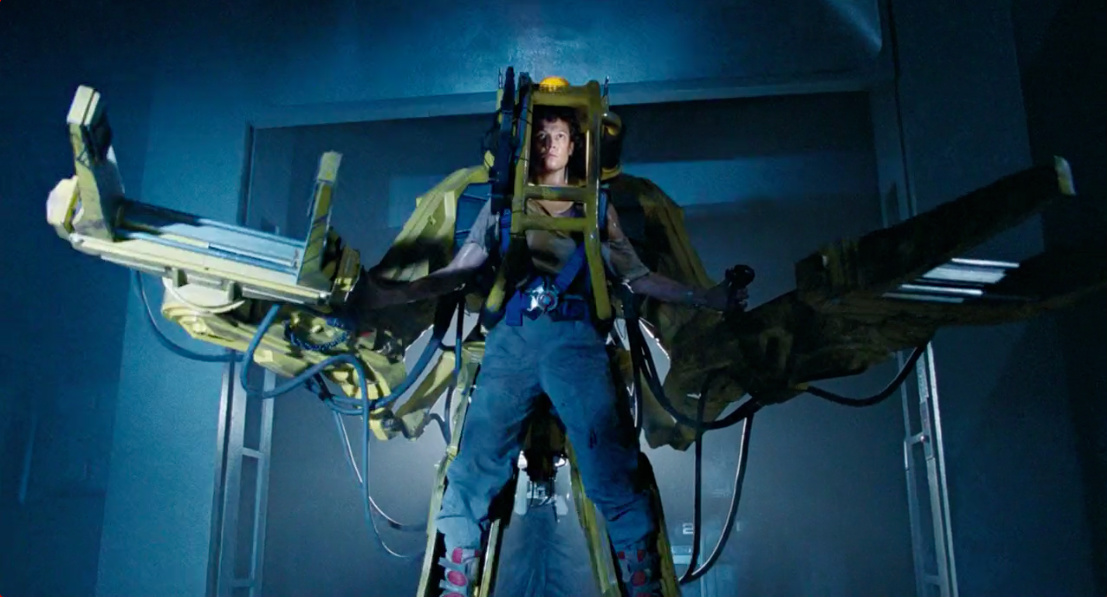
On the surface, Alien and Aliens seem like tremendously different films. Alien is a slow-paced psycho-sexual haunted house horror film set in space, while Aliens is a loud and brash military science-fiction summer action flick. How did they wind up back-to-back in the same franchise, and more to the point, why do they both work so well — not only on their own, but as compliments to one another?
THE CALCULUS OF SEQUELS
Aliens might seem to be, from a cynical business standpoint, a questionable decision. The conventional wisdom in Hollywood is that if a film makes enough money to warrant a sequel, you make that sequel out of the elements which made the first film a success in the first place. The trick, of course, is discerning what those elements are. Sometimes filmmakers get it right — the Riggs/Murtaugh relationship in Lethal Weapon serves as the foundation for the very successful Lethal Weapon 2, for instance, or the strong themes of family and loyalty in both Godfather films. Often, of course, filmmakers will take the wrong lessons from a successful film — deciding Die Hard was a hit because of the lone man + terrorists + confined location formula and giving us Die Hard 2: Die Hard But In An Airport, for example, or having Liam Neeson’s family get kidnapped again in Taken 2. It’s a simplistic calculation that makes a basic kind of sense: “[x] made us money, so if we give the people more of [x], we will make more money.” Of course, that’s not always the case (and it’s rarely that simple anyway), which is why sequels have such a bad reputation and why the sequel that’s better than the original is something of a Hollywood unicorn. Good or bad, though, there’s generally a continuity of tone between films in a franchise, and a strong through-line from one film to the next. The Alien/Aliens duo has the former, as we’ll discuss below, but not the latter.
Aliens is hardly the first sequel to deliberately include more action than its predecessor — both Star Trek II: The Wrath of Khan and Star Trek: First Contact were conceived in reaction to, at least in part, a general consensus that the previous films in the franchise (The Motion Picture and Generations, respectively) were too light on the action, and The Incredible Hulk, while not technically a sequel to Ang Lee’s Hulk, was crafted specifically for the fans who felt that the latter didn’t have enough “Hulk smash!” in it — but it may be the first sequel to almost completely divorce itself from its predecessor’s (primary) genre. The reasoning behind that decision was simple: Writer/director James Cameron didn’t want to risk making an inferior copy of the first film. In Superior Firepower: Making Aliens (part of the Alien Anthology Blu-ray set) producer Gale Anne Hurd says “Jim’s perception was ‘we’re doing a sequel, we’re not doing a remake. We’re not trying to do a gothic horror film, we’re gonna do a combat movie.’” Cameron confirms, “to do a clone of [Alien], or to take one … small baby step away from it would not do. So what I’ve tried to do was take what I personally was interested in from that film … [and bring it] into it a whole other area of science-fiction.” Cameron’s approach to Aliens is perhaps the most creatively pure way to make a sequel — not to completely abandon the elements that made the first film a success, but to expand on them and follow their logical trajectory based on the consequences of the events in the previous film. That is what makes Aliens not only a great film, but a great sequel — that, and the versatility of science-fiction as a genre.
GENRE AS A TOOL
What themes are science-fiction particularly good at exploring? In a very broad sense, a science-fiction setting is most often and best used as a metaphor for the political and social issues of the time in which the filmmakers are living. They don’t even have to be particularly subtle — Invasion of the Body Snatchers presents an obvious metaphor for communism, and Godzilla is very explicitly about nuclear proliferation following World War 2, and the trauma of the Japanese defeat in that conflict. The Planet of the Apes films are largely concerned with issues of class and race inequality. Science-fiction has long been used as a means of exploring these issues — and Alien and Aliens are no different.
It’s true, Alien is largely a horror film, just as Aliens’ primary genre is action. Horror is a genre more suited to exploring not the social and political issues of the day, but the underlying, unconscious anxiety which is a constant presence in any society. Action films, on the other hand, are more concerned with the arc and the growth of a single character. At their most basic level they take a character with a problem and, over the course of the film, they fix that problem. That’s the basic arc for a character in any genre of film, but it’s especially heightened, and often literalized, in action films — just as the underlying fears and anxiety of a society are literalized (usually as a monster or serial killer) in a horror film. Alien and Aliens both use their respective primary genres in this way; Alien, to explore the male fear of rape, pregnancy, and birth; Aliens, the value and necessity of both confronting your past, and not being afraid to move past it.
TWO SIDES OF THE SAME COIN
The theme tying the two films together, and why they work so beautifully in concert with one another, is that evergreen fear and resentment of faceless corporations and overwhelming bureaucracy. The plot of Alien hinges on a massive corporation (ominously only referred to in dialogue as “the Company,” which serves to make it seem even more ubiquitous and anonymous) seeking out a deadly life-form they hope to re-purpose — and presumably sell to the military — as a weapon. Rather, however, than hiring a team of specialists to bring this thing back (possibly as a cost-saving measure, but also likely as a way of keeping their discovery a secret from their competitors as long as possible), they instead re-route a ship populated by manual laborers to unknowingly retrieve this creature. The fact that they’re manual laborers is key — sci-fi has often confronted issues of class (which would be even more sharply relevant to a Briton like Ridley Scott than they would for many Americans), and it’s clear from the dialogue and the general demeanor of the characters that these people are already over-worked and under-paid, and are doubtless not held in very high regard by the Company. Indeed, in Aliens, the reactions of the board members at Ripley’s inquest seem to indicate that the Company considered the Nostromo and its cargo a more valuable resource than its crew. These were not far-fetched ideas for audience members in the ‘70s and ‘80s; the Occupational Safety and Health Act had only taken effect in 1971, and many companies and industries were slow to acquiesce. Even today sweatshops and other unsafe work environments persist, though most have been outsourced to countries with far less stringent health and safety requirements (or at least far less diligent and effective health and safety inspectors) than here in the United States. A company which considered its trade laborers as grist for the mill would have been very easy for audiences to believe in, both in 1979 and in 1986.
Which is why both films can be so tonally different and yet still remain parts of a whole. The faceless corporation actually gains a face in Aliens, in the form of Paul Riser’s Burke, but the Company becomes no less sinister or omnipresent for being personified. Here we see how the Company interacts with its employees and other entities it is forced to deal with; mentioned above is their casual disregard of life displayed during Ripley’s inquest, but the general tone of the inquest is one of casual misogyny directed towards Ripley (granted, the character who won’t be believed when they say a threat is imminent is often present in fiction and can be occupied by both genders, but the tone of the inquest is one of exasperated patronization, which I doubt we would have seen had the Ripley character been a man). This is continued by Burke, who continues to patronize and gaslight Ripley (referring to Ash’s assault on Ripley in Alien — pretty explicitly coded as a rape, incidentally, furthering the general pattern of misogyny — as a “malfunction,” or calling her paranoid for accusing him of unleashing the facehuggers on her and Newt) right up until he has his face caved in by an alien (thus making the corporation, once again, faceless). Burke’s disregard for the lives of the Marines and his general disdain for having to interact with them at all (“he’s just a grunt” — speaking again to class issues and the perceived intelligence gap suggested by class differences) is also clear. Burke, as a representative and personification of the Company, believes himself better — and therefore more worthy of survival — than they are. In other words, the same calculus the Company performed in the first film which made them decide the crew of the Nostromo was expendable.
WHAT ALIENS CAN TEACH US
Cameron’s approach to Aliens is one we see far too rarely in Hollywood. Making a sequel to Alien that looked and felt like Alien would have been the obvious, and easy, choice to make. But Cameron — admittedly, playing to his strengths as a great director of action — took the protagonist and the story in an entirely new direction, yet still managed to ground the film in the same world (featuring the same social woes) as the original. He made a film that’s clearly a sequel and a continuation of the first film’s story — the events of Aliens are explicitly triggered by the events of Alien; the former can’t exist without the latter — and yet still stands as a complete document, thematically speaking at least, unto itself. It’s not only a tough needle to thread, it’s also a creatively brave choice for Cameron to have made (and, indeed, for the studio to back him up on). It’s certainly not unheard of, the sequel that’s not a remake: George Miller, for instance, does something dramatically different with each Mad Max film, and even when it fails (Beyond Thunderdome is a garbage fire, Tina Turner or no), at least he’s trying something new. The second Die Hard may have been a carbon copy of the first, but the third film, Die Hard With A Vengeance, not only takes the protagonist out of the now-familiar “terrorists in a confined location” surroundings, it also features a plot which springs from consequences of events in the first film. And I may not be a hundred percent sure what the hell Joe Dante was going for with Gremlins 2: The New Batch, but you can’t accuse him of resting on his laurels and simply remaking the first film.
But while it may not be unheard of, neither is it the norm. The Marvel movies, fun as they are, all look and feel more or less the same, and they’re frankly starting to blur together. I love the Fast & Furious franchise, but I’m not sure I could tell you if any given scene came from 5, 6, or 7. Films like Jurassic World and Terminator: Genysis are blatant and transparent attempts to try and recreate the magic of their predecessors. Even one of my favorite films from last year, The Force Awakens, is almost hilariously similar in structure to the original Star Wars.
I’m not saying every sequel needs to be a complete departure from what came before. But especially today, with sequels, remakes, and reboots occupying more multiplex screens than ever (soon to include, ironically enough, four sequels to Cameron’s Avatar), it would be nice for someone to take a chance on something different. To risk alienating fans who say (but, I suspect, actually don’t) they want more of the same, and trying something new and different. To not give us Alien 2, but Aliens.



